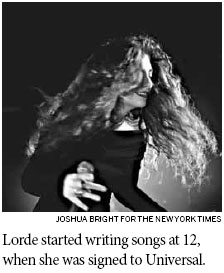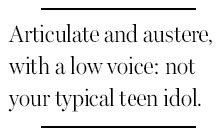Songs that belie her young age
Updated: 2013-10-13 08:25
By Jon Pareles(The New York Times)
|
|||||||
What is "Royals," by Lorde, the New Zealand songwriter, doing in America's Top 10 alongside Miley Cyrus's "Wrecking Ball" and Katy Perry's "Roar"? Most of all, it's insisting that pop listeners don't have to settle for cliches.
Ms. Perry and Ms. Cyrus sing about something teenage girls are presumed to have on their minds: what's left of self-esteem after a breakup. Lorde, meanwhile, is singing about class consciousness and conspicuous consumption: the gap between pop-culture fantasies of Cadillacs and diamonds and the reality of being someone who "didn't come from money." It's a thoughtful, calmly insubordinate song; it's also written by an actual teenager. Lorde, who offstage is Ella Yelich-O'Connor, is 16.
She's a reflective, even somber young woman. In a September concert in New York, she wore a demure black dress and was accompanied by only a drummer, a keyboardist and recorded tracks with her multilayered vocals; behind the musicians were spotlights on stands, nothing elaborate. Apart from the backing vocals, which welled up like phantom choirs, her songs were similarly austere: keyboard parts that might be as sparse as a bass line and a chord or two and subdued, unflashy drumbeats.

Nothing hid Lorde's low, breathy voice, by turns melancholy and resolute. She moved to the beat, but like a teenager, not a music video trouper; her feet sometimes seemed planted to the stage. Lorde wasn't pretending to be a superhuman pop idol, and her opening song, "Bravado," confessed to a battle between shyness and show-business aspirations: "I learned not to want/The quiet of the room with no one around to find me out/I want the applause the approval the things that make me go."
Although her debut album, "Pure Heroine," has just been released, Lorde isn't exactly an overnight sensation. She started writing songs at 12, when she was signed to Universal after she was spotted in a talent show. After she teamed with the songwriter and producer Joel Little, she quietly released "Royals" as part of a five-song online EP in November, with an official release in spring of 2013; its popularity snowballed.
Lorde's songs are lucid, clearly delineated pop, in current modes: anthems, ballads with a hip-hop undertow, four-on-the-floor dance beats. She has learned from Beyonce about switching between articulate, double-time verses and terse choruses. And in songs like "Biting Down," she has learned from Bjork about the power of an incantatory voice set to unfeeling electronics.

Lorde does write about teenage concerns: battling cliquishness in "White Teeth Teens," longing for companionship in "400 Lux," the temptations of drinking and fighting in "Glory and Gore," dreams of refuge in "Buzzcut Season." But she's a world away from the teen-pop staples of come-ons and kiss-offs, whining or flirting; the directness of her voice, and the catchy monosyllables and triumphal melodies of her choruses, carry her through imagery that can be splintered and oblique. She's serious - so serious that she risks being monochromatic. When the sound of a guitar appeared in the last song in her set, "A World Alone," it was a glimmer of possibilities beyond her deliberately restricted palette of keyboards, beats and electronic blips.
Lorde is - with her discreet musicians - on her own, finding her way in a space she is creating for herself. It's one where she has plenty of room to grow up.
The New York Times
(China Daily 10/13/2013 page12)